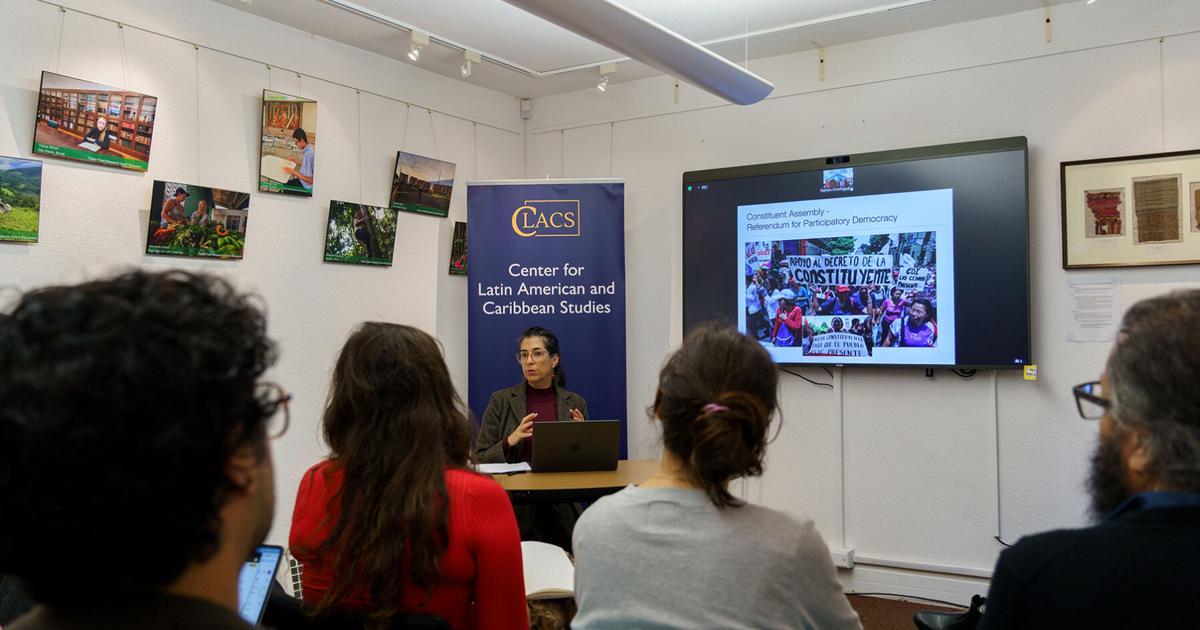Amid U.S. military boat strikes in the Caribbean and rising tension between President Donald Trump’s administration and Venezuela, UC Berkeley faculty Angela Marino and Ramón Grosfoguel hosted an emergency teach-in Thursday to discuss the potential threat of war and its implications.
“It is arguably one of the most significant kinds of assaults since the Cuban Missile Crisis, the Bay of Pigs Invasion of Cuba,” Marino, an associate professor in campus’s theater, dance and performance studies department, said. “It’s arguably even more potentially significant in the geopolitical framework.”
An estimated 15,000 troops have mobilized in and around Venezuela, accompanied by fighter jets, a nuclear submarine and missiles pointed directly at the country, according to Marino. More than 70 people have died in strikes targeting boats carrying alleged “narco-terrorists,” dubbed by U.S. Defense Secretary Pete Hegseth.
U.S. officials have not provided any evidence that the ships attacked were smuggling drugs.
“The moment you put the word terrorism (in a phrase such as ‘narcoterrorism’) … according to the laws created after 9/11 … the USA has built itself authorization to invade a country without being attacked by that country,” ethnic studies professor Grosfoguel said.
According to Grosfoguel, the U.S. presence in Venezuela is focused on resource acquisition, as Venezuela has the largest oil reserves in the world.
Grosfoguel referenced the Iraq war in parallel, describing how the U.S. government developed a narrative of “weapons of mass destruction” in order to convince the American public that the government had plausible justification for invasion.
“It is an explicit violation of international law. It’s a violation of national sovereignty, it’s a violation of due process and it’s also a violation of the United States interest that they are claiming to uphold,” Marino said. “It is not in people’s interest to blow boats out of the water with no evidence.”
In holding the event, Marino hoped to provide perspective and analysis not offered by mainstream media.
UC Berkeley alum Ramon Quintero, who was one of Grosfoguel’s students, said he attended the event to become more informed. Quintero reported feeling a lack of critical voices in the current media.
Local public school teacher and human rights activist Seth Donnelly cited a commitment to learning, as well as concern that “it’s our tax dollars that are paying for these warships.”
“We can go war after war and you’re going to see the same patterns. It’s like a replay of the same story,” Grosfoguel said. “(The U.S. government) always comes out with some fake news and this is always to get the American public on the side of invasion — and now they’re doing the same thing with Venezuela.”
From Marino’s perspective, the United States has already passed a potential threshold that could move the country into war.
She said the UC system has to make a decision in regards to federal funding for weapons research.
“We have been enabling the United States to far exceed any other nation in the world with trillions of dollars of advancement for weaponry that makes this kind of imperialist aggression the result,” Marino said. “This is the outcome.”

